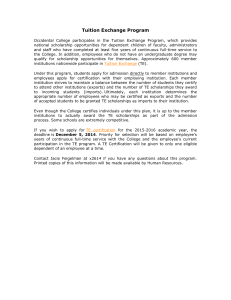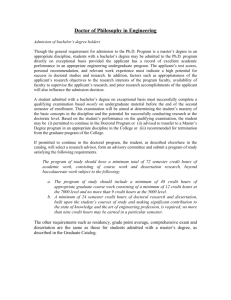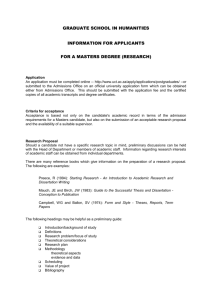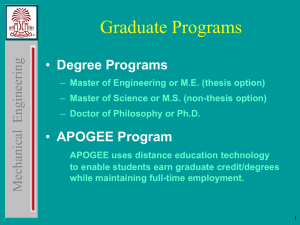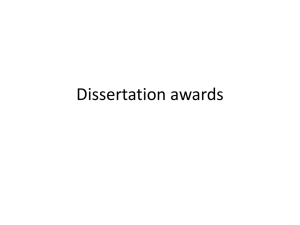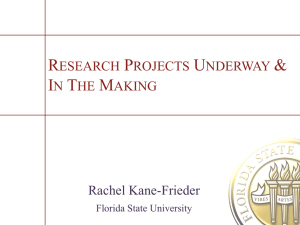Master of Laws for Foreign Law School Graduates
advertisement
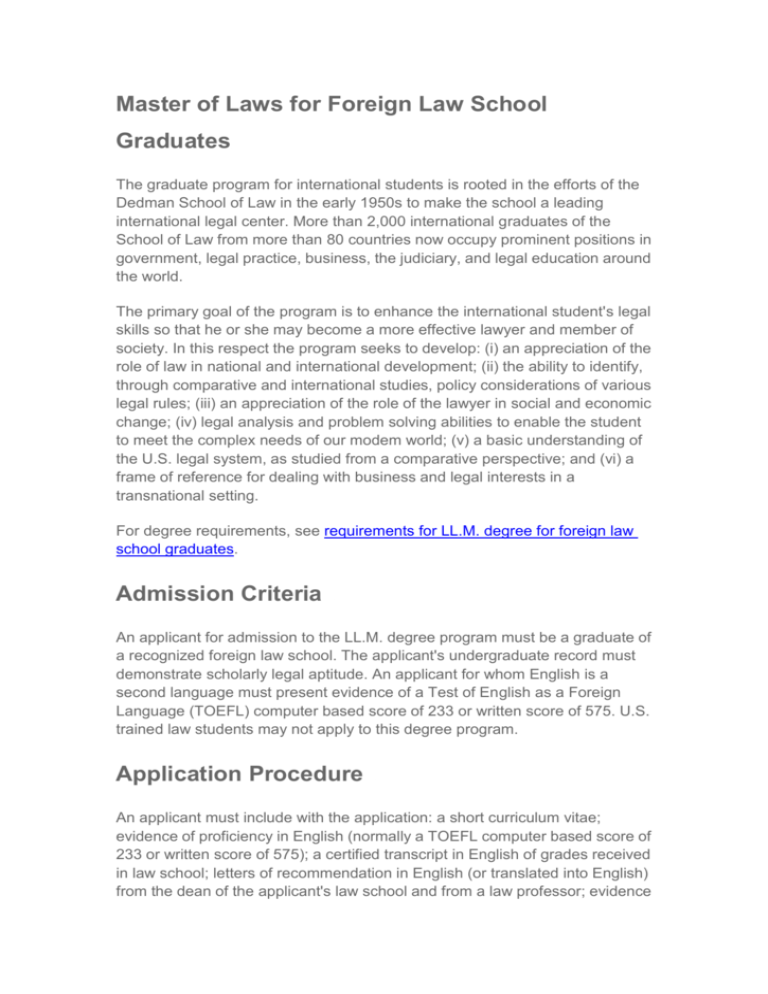
Master of Laws for Foreign Law School Graduates The graduate program for international students is rooted in the efforts of the Dedman School of Law in the early 1950s to make the school a leading international legal center. More than 2,000 international graduates of the School of Law from more than 80 countries now occupy prominent positions in government, legal practice, business, the judiciary, and legal education around the world. The primary goal of the program is to enhance the international student's legal skills so that he or she may become a more effective lawyer and member of society. In this respect the program seeks to develop: (i) an appreciation of the role of law in national and international development; (ii) the ability to identify, through comparative and international studies, policy considerations of various legal rules; (iii) an appreciation of the role of the lawyer in social and economic change; (iv) legal analysis and problem solving abilities to enable the student to meet the complex needs of our modem world; (v) a basic understanding of the U.S. legal system, as studied from a comparative perspective; and (vi) a frame of reference for dealing with business and legal interests in a transnational setting. For degree requirements, see requirements for LL.M. degree for foreign law school graduates. Admission Criteria An applicant for admission to the LL.M. degree program must be a graduate of a recognized foreign law school. The applicant's undergraduate record must demonstrate scholarly legal aptitude. An applicant for whom English is a second language must present evidence of a Test of English as a Foreign Language (TOEFL) computer based score of 233 or written score of 575. U.S. trained law students may not apply to this degree program. Application Procedure An applicant must include with the application: a short curriculum vitae; evidence of proficiency in English (normally a TOEFL computer based score of 233 or written score of 575); a certified transcript in English of grades received in law school; letters of recommendation in English (or translated into English) from the dean of the applicant's law school and from a law professor; evidence of financial ability to pay tuition, fees, and all other expenses during the applicant's stay in the United States; and a recent head and shoulders photograph of the applicant. Scholarship Procedure We do not have a separate application for LL.M scholarships. Your application for LL.M. admission serves as your scholarship application. Available scholarships include: The Storey Scholarship, which provides a stipend toward the payment of tuition and fees for one international student per year. The Helmut Sohmen Scholarships, which provide full tuition, fees and a monthly living stipend for up to four (4) students from China. In addition to the above scholarships, a limited number of tuition remission scholarships may be available to full-time students. If you answered "Yes" to question 7 on the LL.M. application you will automatically be considered for a scholarship. Specialized Courses The following listing illustrates the diversity and depth of courses offered at the Dedman School of Law in comparative and international law. Applicants should note, however, that the law school does not offer all of these courses and seminars each term or even each year. Other related courses not listed below may also be offered each year on a onetime only basis. Comparative Law I and II Constitutional Law (for international LL.M. students) Globalization and the Law Immigration Law International Banking and Finance International Business Transactions International Commercial Arbitration International Crimes International Environmental Law International Intellectual Property International Law (Public) International Litigation and Arbitration International Organizations Law International Protection of Human Rights International Tax I and II International Telecommunications Transactions Japanese Legal System Oil and Gas Contracts: Domestic and International Perspectives of American Business Laws Perspectives of the American Legal System Tuition and Expenses The following are the tuition, fees, and estimated costs for the full-time LL.M. programs for the 2007-2008 academic year. Full-time LL.M. 2009-2010 Estimates Tuition & Fees Books Living Expenses Miscellaneous Total $38,406 1,800 14,000 2,600 $54,206 Next year's tuition and fees will be available in late spring or early summer. Bar Exam Eligibility International students who wish to practice law in this country and qualify for admission to the bar in one of the states or the District of Columbia should familiarize themselves with the bar admission requirements in the particular jurisdiction where they plan to practice. Bar admission requirements vary from state to state. Some states require applicants to have a J.D. degree, and others will require only a certain number of course credits from a law school in this country. The degree of LL.M. does not qualify a person to take the bar examination in Texas or in most other U.S. jurisdictions. Application to the J.D. Program The J.D. is the basic law degree for U.S. law students. For this reason, the School of Law does not normally consider the degree appropriate for international students already possessing basic law degrees within their home countries. However, in a limited number of instances, international students who have graduated with distinction in the LL.M. program of the Dedman School of Law and who can demonstrate legitimate graduate study objectives for furthering their careers in their home countries may be considered for admission to the J.D. program. These students are not required to take the Law School Admissions Test (LSAT). Admission under such conditions will normally entail an additional study of 72-87 credit hours. Advanced credit, if any, is based upon the student’s foreign law study, not on the LL.M. credit. Southern Methodist University Dedman School of Law, Hillcrest Ave. & Daniel Ave. Dallas, Texas Right to Know, Nondiscrimination, and other legal statements. http://www.law.smu.edu/Registrar/Degree-Requirements LL.M Degree for Foreign Law School Graduates Degree Requirements (A) Except with special permission of the Committee on Graduate Legal Studies, all students in this program must begin their studies in the fall term. In addition, they must participate in an extensive orientation program held at the School of Law in mid-August of each year before the start of classes in the fall term. (B) Students pursuing the LL.M. degree for foreign law school graduates must complete 24 hours of credit from courses or seminars selected in consultation with the student's faculty advisor who is assigned during orientation. Faculty members advising candidates for this degree will make every effort to tailor a student's study plan to his or her specific graduate objectives. However, all students are required to take the course on Perspectives of the American Legal System. They will normally also take one basic J.D. course such as Contracts. In addition, many students take Perspectives of American Business Laws and/or International Business Transactions. The School of Law awards the degree to those students who complete their course work with an average grade in all courses equivalent to a C or 1.70. A student will not receive credit for a course or seminar in which his or her grade is below D or 1.00. Students for whom English is a second language are allowed additional time to complete written final examinations. S.J.D. Degree Within a five-year period from first matriculation as an S.J.D. candidate, the S.J.D. candidate must satisfy the following requirements: a. Completion of the two-year probationary period described above. b. Submission of a doctoral dissertation of at least 80,000 words but no more than 100,000 words (including footnotes, but excluding Bibliography, Front Pages, Table of Contents and any Annexes or Appendices) on a coherent, analytical, and focused theme of a substantially legal nature; or submission of an equivalent doctoral dissertation in the form of a series of interrelated articles/chapters on a more general topic, but which collectively comprises a topically coherent volume. c. The dissertation must constitute the original work product of the S.J.D. candidate. d. The dissertation must represent and show evidence of substantial doctoral-level research work. e. The dissertation must display significant legal analyses on a doctoral-level subject. f. The dissertation must be of a publishable quality according to acceptable U.S. law review standards. g. The dissertation must make a substantial contribution to the advancement of the understanding of the relevant research subject matter. h. It is within the discretion of a S.J.D. candidate's Supervisory Committee to require a viva voce (i.e., oral examination), at which the S.J.D. candidate will be asked "to defend" orally his/her dissertation in the presence of the members of the Supervisory Committee. i. The dissertation must be approved by each member of the Supervisory Committee. The award of the S.J.D. requires approvals of the Committee on Graduate Legal Studies, the Law Faculty, and University. Such decisions cannot be appealed, except as provided below. If the S.J.D. candidate's doctoral dissertation is not approved, the Graduate Committee will provide the S.J.D. candidate with an explanation of the reasons why it was disapproved; and the S.J.D. candidate then will be given one further twelve-month period within which to endeavor to satisfy such comments and to resubmit a revised dissertation. If the S.J.D. candidate then does not within the twelve-month period satisfy all doctoral requirements, the person is withdrawn from the S.J.D. program.
